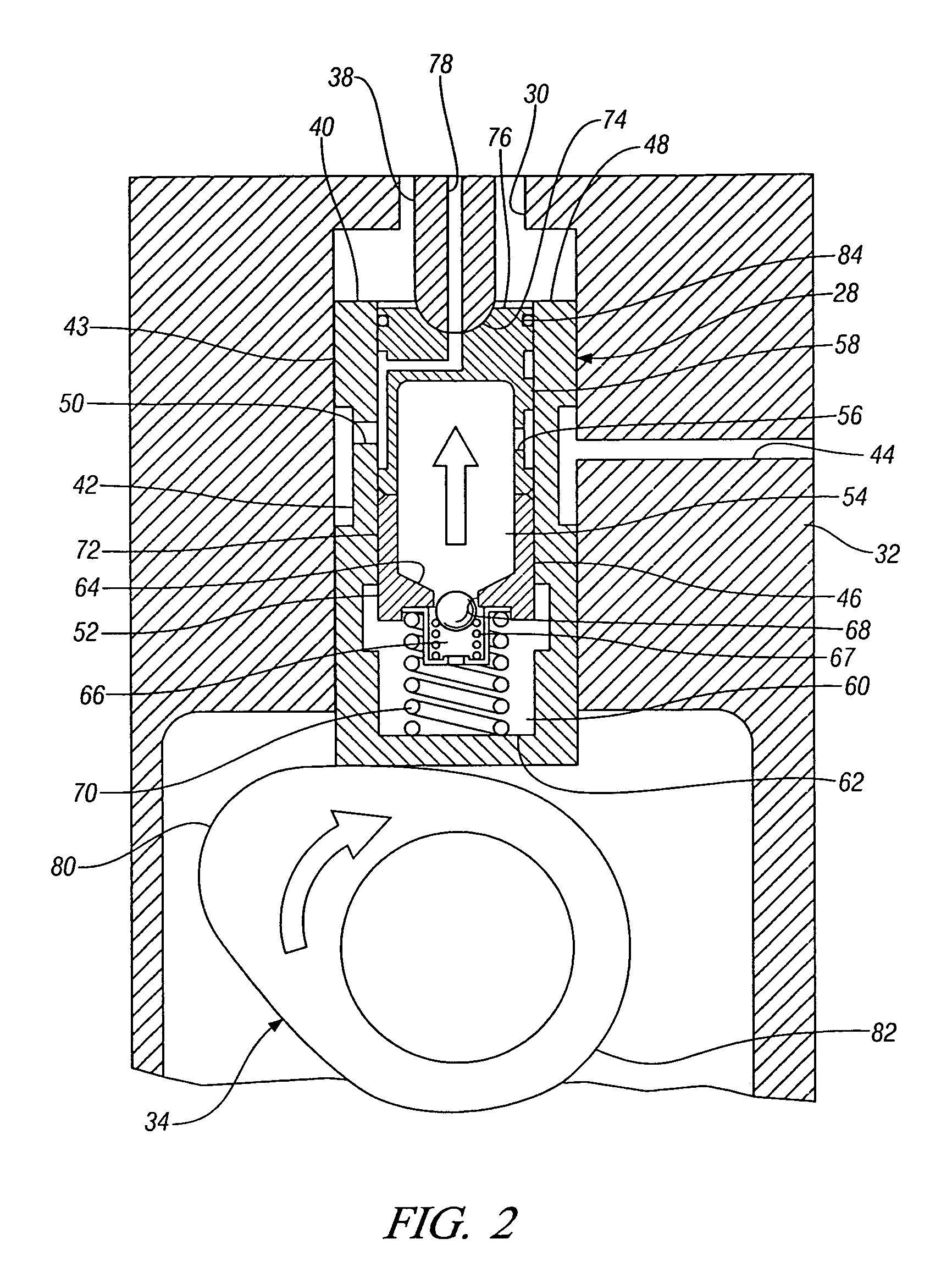Hydraulic lash adjuster
a technology of lash adjuster and lash, which is applied in the direction of valve arrangement, machine/engine, mechanical equipment, etc., can solve the problems of lash adjuster leakage, low and a lower pressure in the high-pressure chamber
- Summary
- Abstract
- Description
- Claims
- Application Information
AI Technical Summary
Benefits of technology
Problems solved by technology
Method used
Image
Examples
first embodiment
[0030]With reference now to FIGS. 2 through 4, the present invention provides a circumferential external groove 84 around the side wall 58 of the plunger 52, between the second oil inlet passage 56 and the distal end 76 of the plunger. The groove 84 is configured to restrict the passage of air through the plunger to body clearance 72 into the reservoir chamber 54. In a first embodiment, the circumferential groove 84 functions as a small reservoir that holds oil to maintain an oil seal in the clearance 72 that prevents flow of air into the high pressure chamber 60 through the clearance 72. The oil is held in the groove 84 by the oil's natural adhesion to metal and by the surface tension of the oil.
[0031]During engine off periods, the oil in the groove 84 is a source of oil to maintain the clearance seal when the distal end 76 portion of the plunger 52 is exposed to air (see for example FIG. 3). This prevents air from entering the high pressure chamber 60 during non-use of the engine....
second embodiment
[0032]Turning to FIGS. 5 through 7B, in the present invention, a seal ring 186 such as an expandable type ring may be disposed in the circumferential groove 184. The seal ring 186 may be metal or plastic with a small gap, or may be made of a flexible, elastomeric material. Generally, the seal ring 186 expands to seal the clearance 172 and naturally contracts to open the clearance 172. More specifically, the seal ring 186 and / or the circumferential groove 184 are shaped such that the seal ring 186 expands when the plunger 152 moves upward / outward for lash take up, the seal ring 186 thereby providing a seal that prevents air from being drawn into the high pressure chamber 160 through the clearance 172. Further, the seal ring 186 contracts when the plunger 152 moves downward / inward to allow an open path in the clearance 172 for proper lash adjuster leak-down.
[0033]In this embodiment, the groove 184 may include a cammed surface 188 that aids in expanding the seal ring 186 during upward ...
third embodiment
[0034]Turning to FIG. 8, in the present invention, an elastomeric U-shaped seal 390 may be disposed in the circumferential groove of the plunger. The seal 390 is designed to provide a good seal in one flow direction, preventing flow in that direction, while allowing flow in an opposite flow direction. In this embodiment, the elastomeric seal 390 is arranged in the groove such that it prevents flow through the clearance in the direction of the high pressure chamber to prevent the flow of air into the high pressure chamber. The seal 390, however, allows flow out of the high pressure chamber through the clearance for proper lash adjuster leak-down. The sealing and flow directions are schematically illustrated by arrows in FIG. 8.
[0035]In the embodiment shown, the seal 390 generally has a U-shaped cross-section that includes a base 392 and two legs 394 extending from ends of a side of the base 392. A slot 396 is defined between the legs 394 and the side of the base 392. Fluid flow that ...
PUM
 Login to View More
Login to View More Abstract
Description
Claims
Application Information
 Login to View More
Login to View More - R&D
- Intellectual Property
- Life Sciences
- Materials
- Tech Scout
- Unparalleled Data Quality
- Higher Quality Content
- 60% Fewer Hallucinations
Browse by: Latest US Patents, China's latest patents, Technical Efficacy Thesaurus, Application Domain, Technology Topic, Popular Technical Reports.
© 2025 PatSnap. All rights reserved.Legal|Privacy policy|Modern Slavery Act Transparency Statement|Sitemap|About US| Contact US: help@patsnap.com



